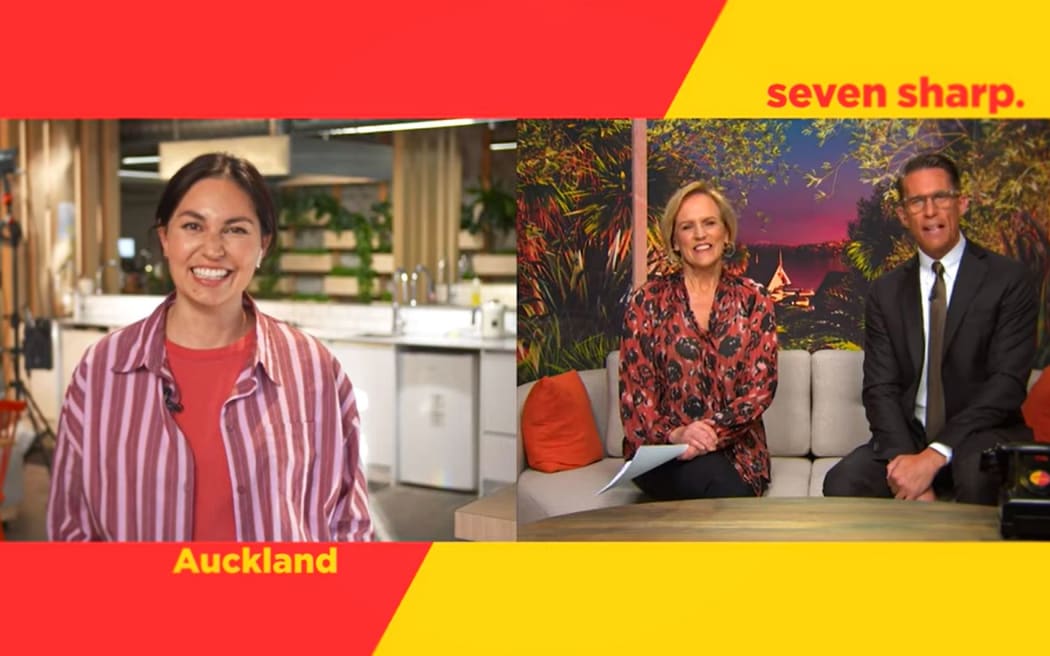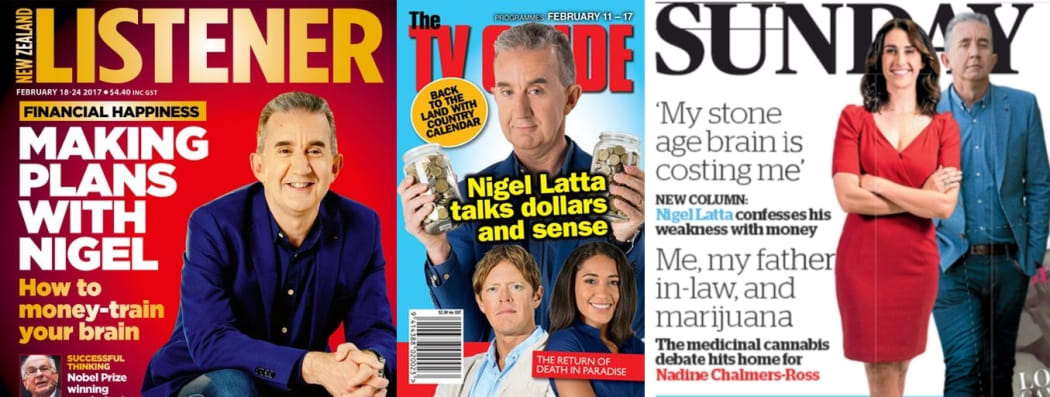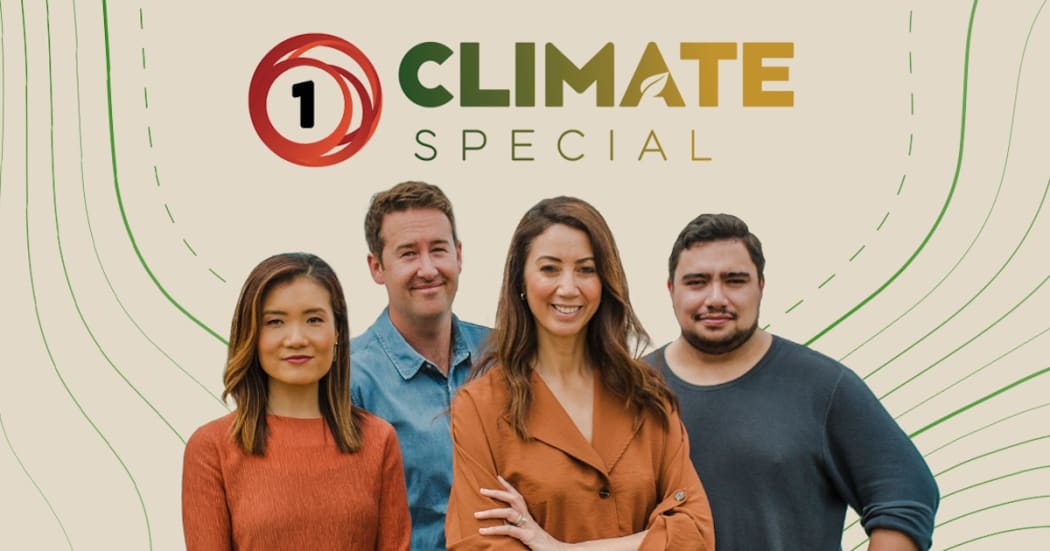It’s meant to be clear what’s advertising and what isn't, but 'sponsored content' and 'native advertising' blurred that line a long time ago. Now some outlets form ‘partnerships’ with clients to get messages across in exchange for big bucks - and even get their own journalists to help out.

TVNZ's 7pm show Seven Sharp hosting My Food Bag founder Nadia Lim n a sponsored slot earlier this month. Photo: TVNZ Seven Sharp
“What's New Zealand's favorite dinner routine? We've got our go-to food guru Nadia Lim to shed some light on it,” Jeremy Wells told viewers in TVNZ’s Seven Sharp earlier this month.
A round up of dinner-time favourites with a media-friendly food guru was fairly standard lifestyle-type fare for this show. Nadia Lim has been on it plenty of times over the years and the meal kit company she co-founded usually gets a mention.
But this time Hilary Barry told viewers: “We've partnered with My Food Bag to reveal some of their insights” and sharp-eyed Seven Sharp viewers would have seen a ‘brought to you by My Food Bag’ message on the screen.
After Lim cooked some chicken, rice and salad on Seven Sharp, she drove home the commercial message in a chit-chat with the co-hosts.
“Lovely to see you. What is it about these meals that makes them so popular?” Jeremy Wells asked Lim.
“I think it's the fact that now we've literally got something to suit everyone,” she added, describing the expanded now range now available.
Sponsored content, advertorials, paid promotions and partnerships

Photo: screenshots
There’s nothing new about TV shows brought to you by sponsors.
Five years ago, TVNZ ran an entire series called Mind Over Money commissioned by Kiwibank.
Shortly after, TVNZ aired an entire prime time series about Qantas which was billed as fly-on-the-wall documentary but was actually made for and paid for by Qantas in Australia.
There’s also nothing new about news and current affairs shows being a vehicle for commercial sponsors.
For years Seven Sharp’s forerunner Close Up was 'Brought to you by Toyota' while the rival show on TV3, Campbell Live, was 'Driven by Mazda'.
Ten years ago, the Herald on Sunday's editor Bryce Johns was made the Herald's 'head of content partnerships' and a former Sunday Star Times editor Lauren Quaintance founded an agency in Australia creating native advertising.
These days TVNZ’s Seven Sharp is “proudly brought to you by ASB Bank,” which is also name checked in the weekly Good As Gold segment of the show.
But usually the sponsor’s message isn't hosted in the show itself, with the hosts puffing up the product, as Wells and Barry did for My Food Bag on that recent episode of Seven Sharp.
In the business that’s called ‘native advertising' though, media companies prefer the more innocuous term ‘integration’.
This week the former chief editor at NZME, Shayne Currie - who’s now an editor-at-large writing about the media each week in the New Zealand Herald - said all commercial media organisations work closely with clients and advertisers these days.
But, he said, they must ensure their newsrooms maintain editorial independence from them.
“We need to tell our audiences when a sponsor or advertiser has come on board for editorial projects or associated content,” he added.
In 2021 he had to put right an instance of this going wrong at NZME when its rivals at Stuff revealed NZME property platform One Roof had hosted a series of articles for Crown housing agency Kāinga Ora. It had paid NZME $25,000 a month for this coverage, but that wasn’t disclosed to readers of the stories at he time.
TVNZ confirmed Seven Sharp’s recent piece “brought to you by My Food Bag” was indeed sponsored content.
“The support of our advertising partners pays for our journalism. Transparency in advertising is important to us,” TVNZ told the Herald.
“We mark our integrations with a verbal and visual acknowledgement. Not all our competitors do this,” the spokesperson added.
“We have a rigorous process to ensure every partnership story we produce on the show is a great editorial fit,” she added.
“We think we’ve got the balance right,” TVNZ told the Herald last week.
But when My Food Bag tweaked its offering back in 2021, Nadia Lim was also on the Seven Sharp couch. Wells told viewers they had been in touch with “our mates from My Food Bag . . who have the fresh start you’ve been looking for”.
After Lim made another chicken and rice dish (nasi goreng this time) Hilary Barry heartily endorsed the company.
“The recipe for that meal is up on our Facebook page now and you can sign up for your Fresh Start six-week reset at myfoodbag.co.nz,” she said.
There was no explicit declaration of any sponsorship on the air or the screen that time - or in 2018 when Lim plugged a new My Food Bag budget range the same show.
Lifestyle? Or news?
TVNZ was at pains to point out last week its other news was not ‘for hire’ in this way.
“1News bulletins and current affairs programmes Fair Go, Sunday, Q+A and Te Karere do not take this type of advertising material,” TVNZ told the Herald.
But flagship news and current affairs shows have also been used for sponsored content.
Last year Kiwibank paid for current affairs-like content hosted by Sunday reporter John Hudson played during ad breaks during the show. Q+A presenter Jack Tame fronted news-like slots targeting small businesses which were promotions for Xero.
This paid-for content was badged with the sponsor's name, but also hosted on TVNZ + and on the programmes’ social media feeds alongside the real journalism and reports from those shows.
Lately other ‘integrations’ have been questioned.
In November last year, Stan Walker told Seven Sharp all about his passion for climate action and viewers were urged to watch an upcoming hour-long TVNZ 1 special on the climate crisis.
On Facebook Seven Sharp said the segment was ‘in partnership with Gen Less’ - a campaign run by the Energy Efficiency and Conservation Authority (EECA) encouraging all Kiwis to reduce energy consumption and take climate action themselves.

TVNZ's Climate Special aired in November 2022. Photo: TVNZ
That TVNZ climate special in November was presented by TVNZ Sunday host Miriama Kamo and three other TVNZ journalists. It featured a blink-and-you’ll-miss-it verbal and verbal message one minute into the programme, but no other acknowledgement that it was the product of a sponsored content partnership with EECA.
Back in July the answer to a Parliamentary Question from National MP Simeon Brown revealed that TVNZ climate special and Seven Sharp's Stan Walker feature were part of a package (to coincide with COP 27 climate talks in Egypt) for which EECA paid TVNZ $300,000.
It also included five stories on the 1News.co.nz website and associate social media posts - and five interviews across a week ‘integrated’ on TVNZ’s Breakfast which featured EECA climate and energy experts.
At the time, TVNZ’s commercial director Jodi O’Donnell said the TVNZ Climate special was part of TVNZ’s own “sustainability journey".
Simeon Brown’s parliamentary question also revealed EECA paid Stuff $200,000 for five stories, display and video advertising and articles in the weekend newspapers’ supplements.
The $500,000 spent on the Stuff and TVNZ partnerships took up only a small slice of the $4.6 m EECA spent on advertising and PR in year to June 2022.
Stuff declared in 2019 it had partnered with Gen Less when Stuff reported on EECA’s plans for big-budget media campaigns.
Stuff told the Herald this week it was “comfortable that all content generated as part of this partnership complied with Stuff’s advertising-related content policy”.
“Editorial content on Stuff cannot be bought or sold," Stuff general counsel Genevieve O’Halloran told the Herald.
“We've got NZ on Air which already has ... an allocation of taxpayers money to make those decisions. There are more questions (about) whether this practice has been used more widely in government, and whether there were requirements for disclosure as to who was paying the bill for those interviews, particularly on the likes of Seven Sharp or Breakfast on television,” MP Simeon Brown told The Platform this week.
The level of disclosure is up to the host media companies' own policies
Stuff’s publicly-available policies on sponsored content are detailed and say all sponsored content must be clearly marked as such - and “does not come with the expectation of influence over editorial content".
At TVNZ, the ‘integrations’ depend on the flexible interpretation of what’s lifestyle stuff, and what’s considered news and current affairs, which requires real independence.
TVNZ also has in-house agency Blacksand to create content for campaigns.
TVNZ’s Advertising Terms & Conditions say its presenters are required to obtain TVNZ sign-off before appearing in ads which “cannot be placed within or adjacent to a programme in which the TVNZ presenter features”.
But the Kiwibank-sponsored features about sustainable businesses hosted by Sunday’s reporter John Hudson ran in the commercial breaks during the Sunday show on TVNZ 1 - and they’re also on the show's section of the TVNZ + on-demand platform.
The Xero-sponsored ‘Business Insight’ videos presented by Q+A host Jack Tame aired in ad breaks during TVNZ news programmes and were also hosted on the 1News social media pages.
This week Mediawatch sent TVNZ questions for commercial director Jodi O’Donnell, who oversees partnerships with clients seeking on-air content.
TVNZ responded by email to say it is “happy with the EECA partnership” but will add additional sponsor logos to items on Breakfast.
“We are always looking at how we can further strengthen transparency around paid-partnering,” said a TVNZ spokesperson.
Mediawatch also asked if participation of TVNZ news journalists is specified in partnership agreements such as the ones TVNZ reached with EECA and Kiwibank.
TVNZ said no, and that it “retains editorial control over how partnerships are implemented”.
What’s advertising? And ‘advertorial’?
“Where a story is enabled by sponsorship, gift or financial inducement . . . that should be declared,” according to the principles the Media Council which covers some online news content.
This is echoed by the advertisers’ watchdog, the Advertising Standards Authority’s guide: When is an editorial feature advertising?
“The public is entitled to know when it is reading, listening to or viewing ‘advertorial’ because it will regard differently information generated by an advertiser in its own favour - and information generated by the media in its own right, which can be expected to have a quality of independence,” it says.
The ASA also suggests a number of tests to determine which is which - including: ”Is the item independent of control in any measure by the advertiser?”
The founder of a just-launched association of media and marketing agencies told Mediawatch the rules are tighter in the UK.
“We've got to be really careful (about) the people who aren't necessarily as au fait with the difference between what is sponsored content, what is advertising and what is content,” said Alex Radford, the chair of Independent Media Agencies New Zealand (IMANZ) which represents 28 independent local media agencies.
“Anything which is not transparent that is clearly paid for advertising, in my opinion is problematic, especially when it sits within news or news-like content. I think that it's the responsibility of the broadcasters to ensure their listeners or readers or viewers understand if what they're watching is being paid for by a commercial organisation,” Radford, who’s also chair and co-founder of Auckland based agency D3. told Mediawatch.
Should we expect more news-like content in our media as commercial clients seek ‘partnerships’ in the style of My Food Bag or EECA?
“I think a partnership where there is commercial interest from one party is advertising. We want to be able to put products and services in the place where most people will be able to buy those products or services. I think that pragmatic common sense is key to what is okay,” he said.
Can news journalists fronting sponsored content to add credibility to it end up confusing the audience?
“It gives credence and weight to their message they're trying to put through. I'm from the UK where there are very clear guidelines from (the UK media regulator) Ofcom that you can't use talent in any of the advertising breaks within an hour each side of their programme.
“There was a lot of this back in the 1990s when people were trying to do things like put bottles of Smirnoff in the pub in Coronation Street or EastEnders - and people didn't like that,” he said.
Different media companies here have different policies and practices for dealing with sponsored content and flagging it for the audience.
And while commercial media organisations need revenue these days from wherever they can get it, they need to keep full control of sponsored content to enforce their policies properly.
Because the other thing in short supply these days is public trust in the media - a different kind of currency they need in reserve.


